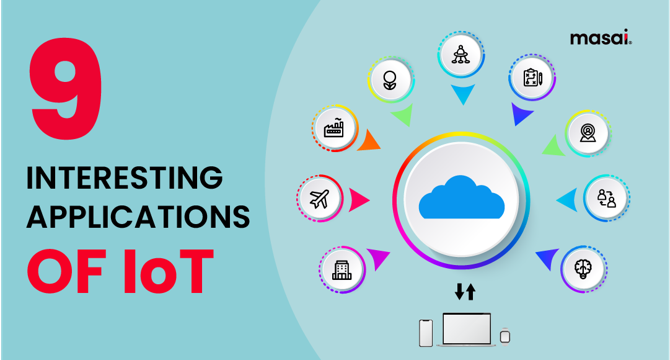Medium
1M
331

Image Credit: Medium
9 Interesting Applications of IoT
- The Internet of Things (IoT) is revolutionising various industries in numerous ways. Smart homes are the most popular IoT application on this list. Smart homes control home appliances such as lights, alarms, and water flow from faucets, while also promoting home security and safety through sophisticated, smart security systems.
- A smart city, which aims to make cities more efficient and less expensive, is another popular IoT application. Government services, transportation, and traffic management, energy, healthcare, water, innovative urban agriculture, and waste management all benefit from smart cities.
- Wearable technology is likely to benefit the healthcare sector the most. Patients who wear intelligent gadgets can monitor data such as blood pressure and body temperature, which is subsequently transmitted in real time to their medical staff.
- The future of agriculture seems bright with IoT. With the use of motion detectors, light detectors, and motion sensors, it is now easy to gather real-time farm data such as soil moisture content, the amount of sunlight received, soil’s water retention capacity, etc. It helps farmers keep track of their crops and regulate practices if the need arises.
- The coalescence of IoT in the automotive industry has opened doors for better fleet management and manufacturing processes all over the world. IoT comes in handy at both the industrial as well as commercial levels in the automotive industry.
- The supply chain management industry is one that has fully tapped into the potential of IoT. The introduction of IoT has significantly reduced the need for human intervention. It is now possible to easily locate goods stored in warehouses and accurately predict the time of product delivery.
- The sole focus of IoT in industries is to reduce human intervention. With control systems that are driven by data, it is now possible to automatically run industrial machines and processes.
- With the coming of IoT, there has been a shift in paradigm in the manufacturing landscape. When data analytics and IoT join hands, they create wonders. IoT is a platform that connects the virtual and real worlds through RFID, sensors, AI, connectivity, and communication devices.
- The need for IoT will only grow over time as people strive for a better life than they had the day before, and IoT will only help improve. It will also contribute to the state’s and firms’ economic improvement. As a result, IoT is more than just a way to communicate without human intervention; it is a way of life in and of itself.
- Airbus has launched the Factory of the Future digital manufacturing initiative with the integration of sensors into shop-floor tools and machines, as well as wearables like industrial smart glasses to reduce errors and improve workplace safety. Wearables enabled a 500% increase in productivity while nearly eliminating errors in one procedure known as cabin-seat marking.
Read Full Article
19 Likes
For uninterrupted reading, download the app